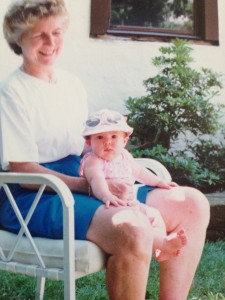 I am 53 and my go-to sandwich is a good old fashioned peanut butter and jelly sandwich. I know some folks my age would claim bologna and cheese. I can recall a few spam sandwiches at the camp in Maine. There is something intriguing, if not gross, when you have to take your lunchmeat out of a can and pass it through a grinder which is why, I am sure, we were willing to eat that stuff.
I am 53 and my go-to sandwich is a good old fashioned peanut butter and jelly sandwich. I know some folks my age would claim bologna and cheese. I can recall a few spam sandwiches at the camp in Maine. There is something intriguing, if not gross, when you have to take your lunchmeat out of a can and pass it through a grinder which is why, I am sure, we were willing to eat that stuff.
But I am not referring to the various trends in sandwich meat over the decades. No, I am talking about the phenomena related to caring for family members who are on both ends of the age spectrum. This is a relatively new term, first coined in 1981 and entered into the Merriam Webster Dictionary in 2006. http://www.merriam-webster.com/dictionary/sandwich%20generation
Once characterized by folks in their 30s and 40s, this trend has moved from predominantly Baby Boomers and now is strongly represented by Generation Xers. Due to extended life expectancy, delayed parenting, and increased need for both parents to work while raising a family, 47% of adults aged 40-60 fit this description. 80% work and many of these people will have their job impacted by the increased demand of caregiving, resulting in lost wages, reduction of work hours, and at times, loss of employment. http://www.pewsocialtrends.org/2013/01/30/the-sandwich-generation/
I am a Baby Boomer and now am part of the “Club Sandwich” generation. No kidding. That is an actual term, though it has not yet been picked up by Merriam Webster. Like many Baby Boomers, I am now a grandparent. The Club Sandwich generation describes those of us who are still supporting, in some fashion, our own children, while also providing support to our parents, and now have become grandparents. I officially made the “Club Sandwich” club this year on June 2nd and I am loving it! http://www.sandwichgeneration.com/
But being in the sandwich generation isn’t easy. Part and parcel with this definition is the concept of providing care. Providing care to multiple generations. Usually in unchartered territory. As we navigate caring for aging parents we are often caught unaware, reacting to circumstances in which we feel alone. And even more so because while we sit in the emergency room from 7 pm to 1 am, our children are elsewhere, likely needing us for something, if only to tuck them into bed.
It seems too, that because the care we are providing is for our parents, the very people who cared for us and then happily (or unhappily) lived on their own, something seems out of sorts. Because these are grown-ups who need help it seems that it is not talked about and support is more difficult to find. Everyone at work expects to see less of us after having a baby. Few understand that it could be our parents who take us from work, from sports activities, from social time with friends because there are no free minutes in the day, week, or month.
The risks are well documented. The “sandwichers” are more likely to get sick if we are without support. But this same group will report higher levels of happiness if they do seek help. Still able to provide care when needed, given regular and reliable assistance, the sandwich generation will express a love for the family member who needed help that is deepened and richer than previous felt. And most say, although it was the hardest thing they ever did, they would not have it any other way.
With life expectancy rising and the first of the baby boomers approaching 70, we have not yet seen the full impact of this phenomena to society. Being prepared and finding a way to reap the full benefit of the joy associated with caring for our loved ones means first understanding that you cannot go it alone.

